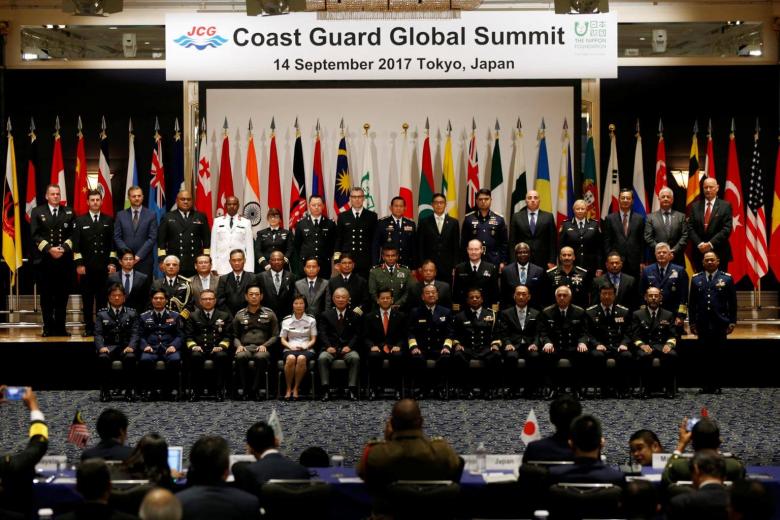TOKYO - A rules-based maritime order is key to protecting the oceans and seas, top coast guard officers from over 30 nations - including the United States, China and Singapore - agreed on Thursday (Sept 14).
This comes as Tokyo hosted the first Coast Guard Global Summit, in a departure from previous coast guard meetings that were only held at the regional level.
"Strengthening cooperation between maritime security agencies and increasing dialogue is required now, to cope with the stiffer challenges facing the world today," said Minister of Land, Infrastructure, Transport and Tourism Keiichi Ishii, whose ministry oversees the Coast Guard.
These challenges, as laid out in a 12-point summary after a day of closed-door sessions, include coping with climate change, migration, over-fishing, terrorism and piracy, as well as improving distress and disaster response.
"Recent environmental change has led to more serious disasters and may have an adverse effect on the navigational environment," the summary said
It added that extremism and radicalism have also led to the resultant threat of terrorism and maritime crimes at sea.
Admiral Satoshi Nakajima, Commandant of the Japan Coast Guard, told reporters that specific issues such as the threat of North Korean missiles falling into open waters, and sovereignty disputes in the East and South China Seas, were not discussed.
The summit came just days after Japan on Monday marked five years since it nationalised the disputed Senkaku islands. Chinese Coast Guard vessels have frequently entered Japanese territorial waters near the islands in a sign of protest.
At a news conference Monday, top government spokesman Yoshihide Suga issued a stiff rebuke: "The repeated incursions into our territorial waters is truly regrettable. We would like to handle the situation firmly and calmly."
China has chafed at international criticism that it has been ignoring the rule of law at sea, in its unilateral construction of military assets in the South China Sea. Four Asean members - Brunei, Malaysia, the Philippines and Vietnam - have overlapping claims in the South China Sea with Beijing.
Japanese Prime Minister Shinzo Abe had, at a reception welcoming the guests on Tuesday, said forming common values and firm bonds via an international summit at a time of global challenges would be akin to "a lighthouse shining in the dark ocean".
Dr Heng Yee Kuang of the University of Tokyo told The Straits Times: "Tokyo has long tried to rely on its Coast Guard as a non-military tool to enhance its regional presence and security profile."
Such a multilateral forum, he added, would be useful for Japan to "minimise any potential residual concerns about Japan being once again an active security actor".


